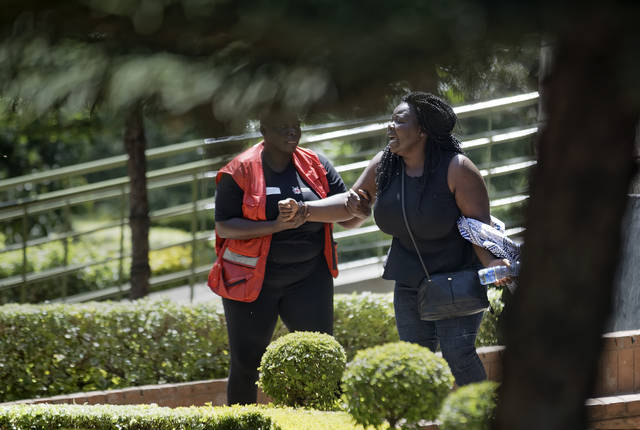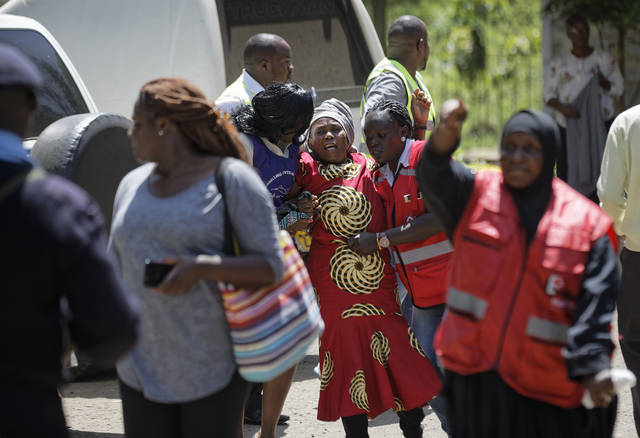NAIROBI, Kenya — Kenyan authorities on Thursday arrested nine more people for their alleged involvement in the deadly extremist attack on a luxury hotel complex in Nairobi this week, bringing the total number of suspects detained to 11, police said.
The suspects, “are being questioned on their specific roles in the terrorist attack” at the dusitD2 complex on Tuesday, said a police officer who spoke on condition of anonymity because of the sensitivity of the matter. Two people were taken into custody on Wednesday.
The attack took the lives of 20 civilians, one police officer and five attackers.
Kenyan bomb disposal experts, meanwhile, found and safely detonated an explosive left over from the attack, and the Kenya Red Cross said no one appeared to be missing after it checked nearly 100 reported cases.
The Kenyan government said its quick reaction to the assault reflected improvements in its ability to respond to such brazen attacks on civilian targets. It was “much better handled” in comparison to the 2013 attack on the nearby Westgate Mall, said Joseph Mucheru, the information minister. Police took hours to respond to that attack and official information was scarce or conflicting, leading to reforms.
“The speed, the response and the conclusion of this matter was swift,” Mucheru told journalists.
Al-Shabab, the al-Qaida-linked extremist group that carried out the 2013 attack that killed 67 people, claimed responsibility for the hotel assault.
In contrast to the government’s fumbling response to the 2013 attack, the better-coordinated operation at the hotel was under the “central command” of the head of the paramilitary wing of the Kenyan police known as the General Service Unit, according to The Standard, a Kenyan newspaper. It also said there were “fewer implausible narratives from senior security officials than happened in 2013.”
Still, the newspaper said, there were hard questions including: “How did the assailants manage to move their weaponry through the numerous roadblocks to their hideout and to the scene of crime undetected?”
President Uhuru Kenyatta on Wednesday declared that the security operation to retake the complex was over, around 20 hours after the attack started.
With the attack, al-Shabab showed it can still strike despite heavy pressure by U.S., Somali and African Union forces against its strongholds in neighboring Somalia.
While U.S. airstrikes have kept al-Shabab on the run, the new attack shows the group is still capable of carrying out spectacular acts of violence in retaliation for Kenya sending troops to Somalia to fight it. The Islamic extremist group’s deadliest attack in Kenya was the assault on Garissa University in 2015 that claimed 147 lives, mostly students.
This week’s bloodshed in Kenya’s capital appeared designed to inflict maximum damage to the country’s image of stability and its tourism industry, an important source of revenue.
The information minister, however, said he had been impressed by Kenyans who posted images highlighting wildlife and other attractions on social media in reaction to the attack. He noted that the Nairobi stock exchange made gains on Wednesday.
“There’s that positivity,” he said.
U.S. ambassador Robert F. Godec said the United States was working closely with Kenyan authorities, and he dismissed “false reports on social media” that the U.S. knew about the attack in advance.
Of the dead, 16 were Kenyan, one was British, one was American and three were of African descent but their nationalities were not yet identified, Kenyan police said late Wednesday. Twenty-eight people were hospitalized.
Four of the 100 hotel employees who were on duty were killed, said general manager Michael Metaxas. Another three were injured. The hotel conducted an evacuation drill as recently as December, he said.
A company that provides security for the complex confirmed that two employees had been killed. Michael Ruto of Senaca International Security Ltd. described them as “very good officers.”
The East African operation of LG Electronics mourned the death of an employee. It described James Radido as “a truly inspiring and genuine human being.”
In his last tweets, Radido talked about being “trapped in our buildings” and reported gunfire and “non-stop explosions.”
His last words on Twitter were: “Any news from out there?”
———
Follow Africa news at https://twitter.com/AP—Africa



